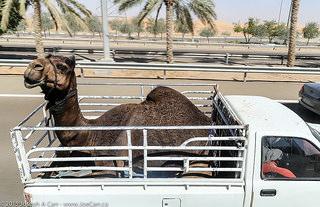Epidemiologic and genetic investigation of two men from the United Arab Emirates (UAE) who were found to have asymptomatic MERS-CoV infections after exposure to sick camels supports zoonotic exposure as a transmission route, researchers reported yesterday.
In other Middle East respiratory syndrome coronavirus (MERS-CoV) developments, the total in an outbreak in Riyadh, Saudi Arabia, grew by four and the death toll by one, according to a statement today from the country's Ministry of Health (MOH).
UAE camel surveillance yields clues
The study of the infected camels and the two men relates to illnesses announced by UAE officials in May that involved camels driven by truck from Oman to the UAE border. Researchers from the UAE, Hong Kong, and the US Centers for Disease Control and Prevention (CDC) described the investigation findings yesterday in an early online edition of Emerging Infectious Diseases.
A man delivered eight dromedary camels to the UAE on May 7, and on the same day authorities at the border obtained samples from the animals as part of a MERS-CoV screening program. Three days later, when tests were positive, health officials tracked humans who had contact with the infected camels. Earlier reports said the first patient who tested positive was the truck driver, who frequently transports camels between the two countries.
The second patient who tested positive was a 33-year-old man who worked at the camel-screening center. Both men were asymptomatic through the time tests showed that the virus had cleared. Follow-up tests on the camels found that some animals testing positive had nasal discharge and that two 4-month-old calves had the highest viral loads.
The viral RNA from the human samples was too low for complete gene sequence testing; however, the researchers were able to examine partial MERS-CoV spike and the nucleocapsid regions.
Gene sequences from the camels and the men, combined with the epidemiologic findings, strongly suggest zoonotic transmission, but the team said they couldn't rule out the remote possibility that the camels and men were infected from independent sources.
The investigators said the findings help build the case that asymptomatic infections can result from animal transmission, though they added that it's not clear if such infections can fuel transmission among humans.
Sequences from the camels and the men were similar to those recently detected in Saudi Arabia and South Korea, according to the study. Although there is no sign the clade is more transmissible, the fact that a single introduction triggered such a gush of cases in South Korea warrants further genetic risk assessment, the team wrote.
Four more Riyadh cases, another death
The latest lab-confirmed MERS-CoV infections in Saudi Arabia all occurred in Riyadh and all of the patients had contact with a suspected or confirmed case-patient in the community or the hospital setting. All four are Saudi men, and they range in age from 45 to 99 years.
The announcement raises the number of illnesses reported from Riyadh since Aug 1 to 24. At least one family cluster has been reported in the community, and some of the illnesses reflect health facility–related spread.
All four patients are hospitalized in critical condition, and none are healthcare workers.
The fatality occurred in an earlier announced case, a 73-year-old woman from Riyadh who had underlying medical conditions.
One more patient recovered from her MERS-CoV infections, lifting the number who have recovered so far to 587. Twenty people are still being treated, and two are in home isolation.
The four new cases increase Saudi Arabia's overall total from the disease to 1,082 cases, 473 of them fatal.
See also:
Aug 10 Emerg Infect Dis study
Aug 11 Saudi MOH statement
May 18 CIDRAP News story "UAE confirms MERS infection; Saudi cases pass 1,000"





















